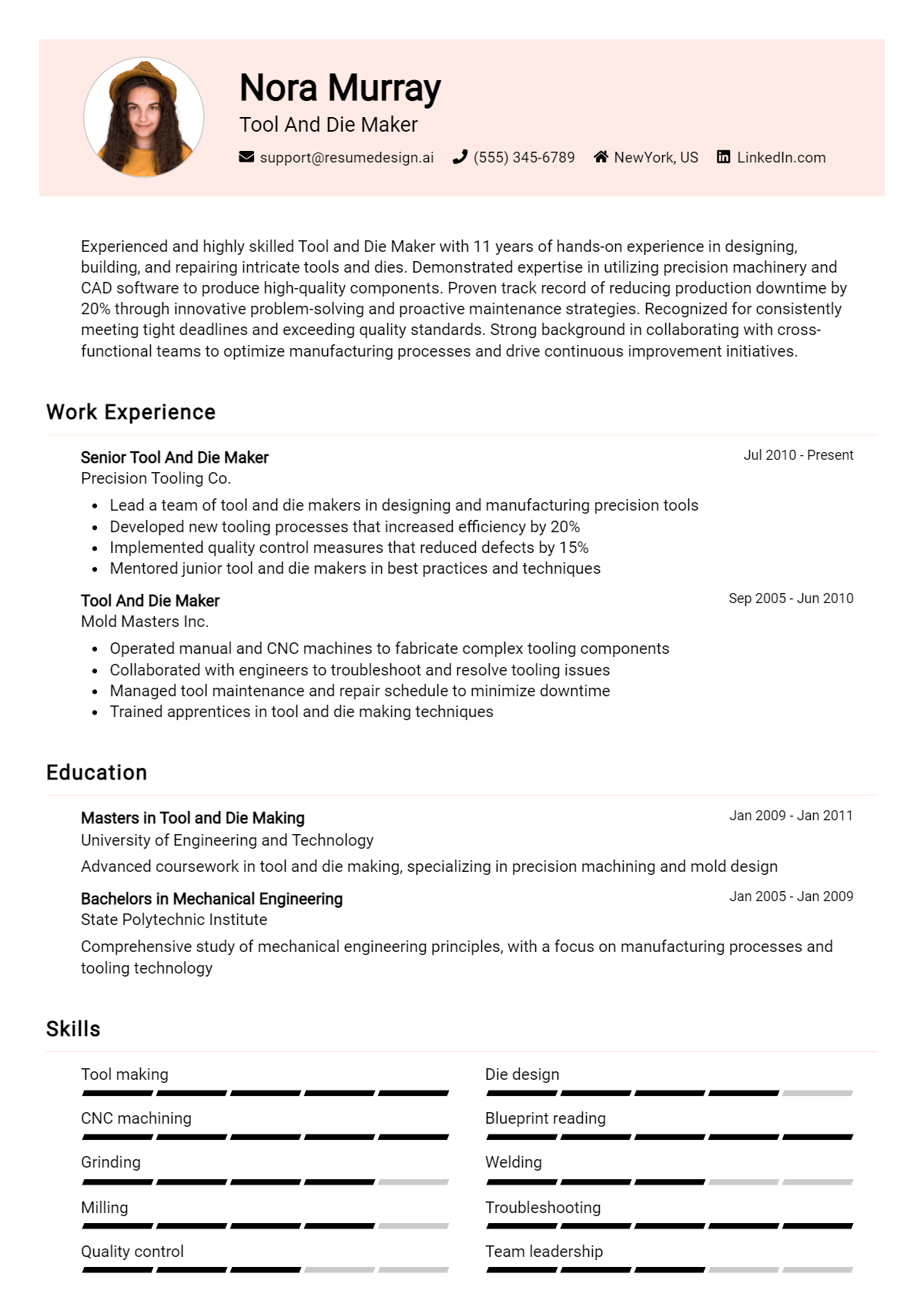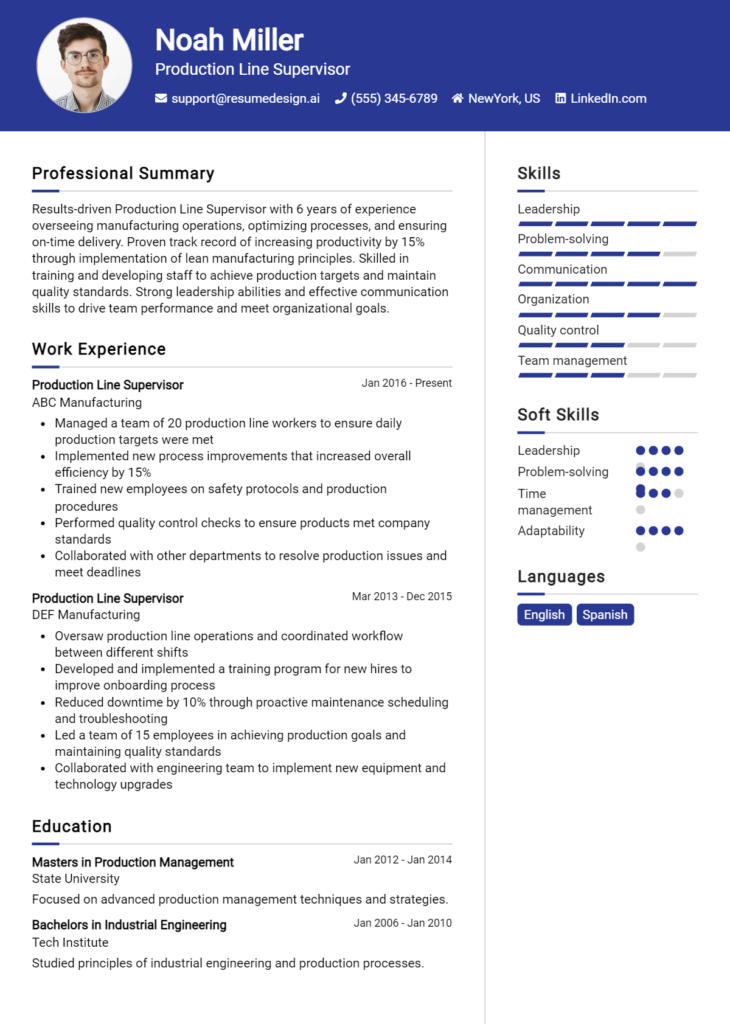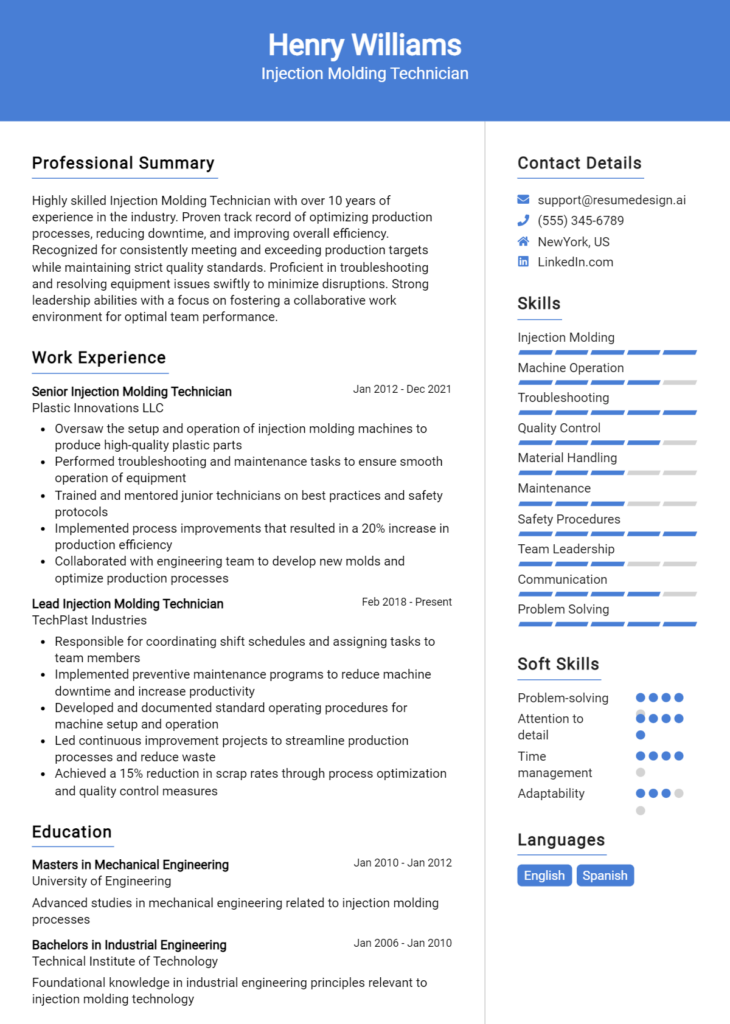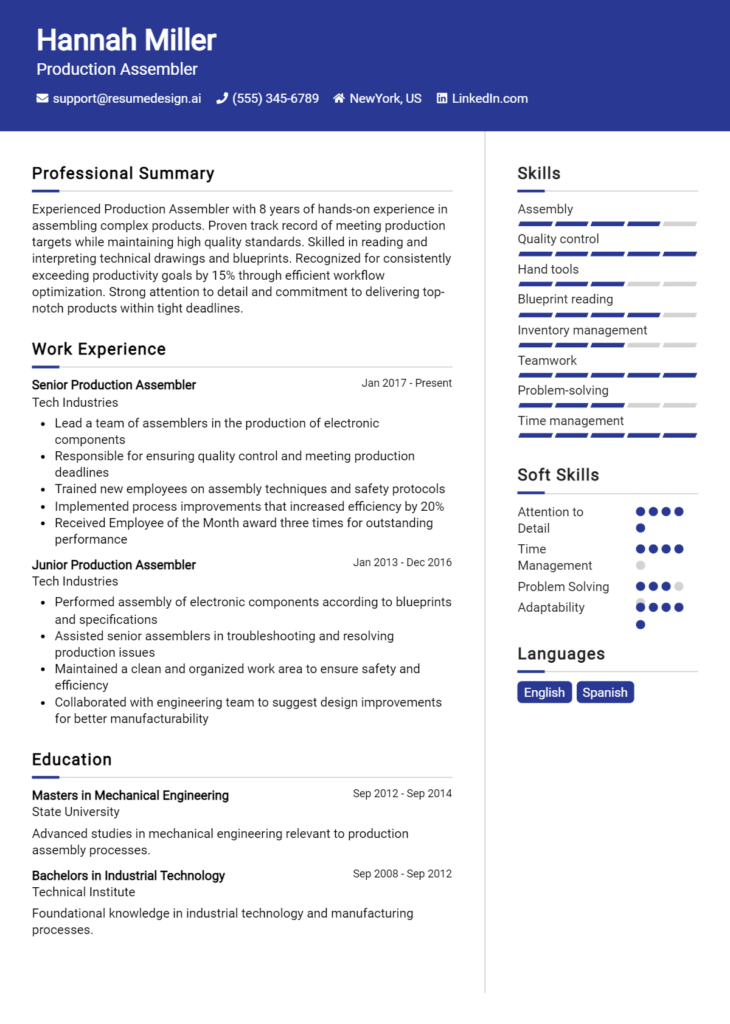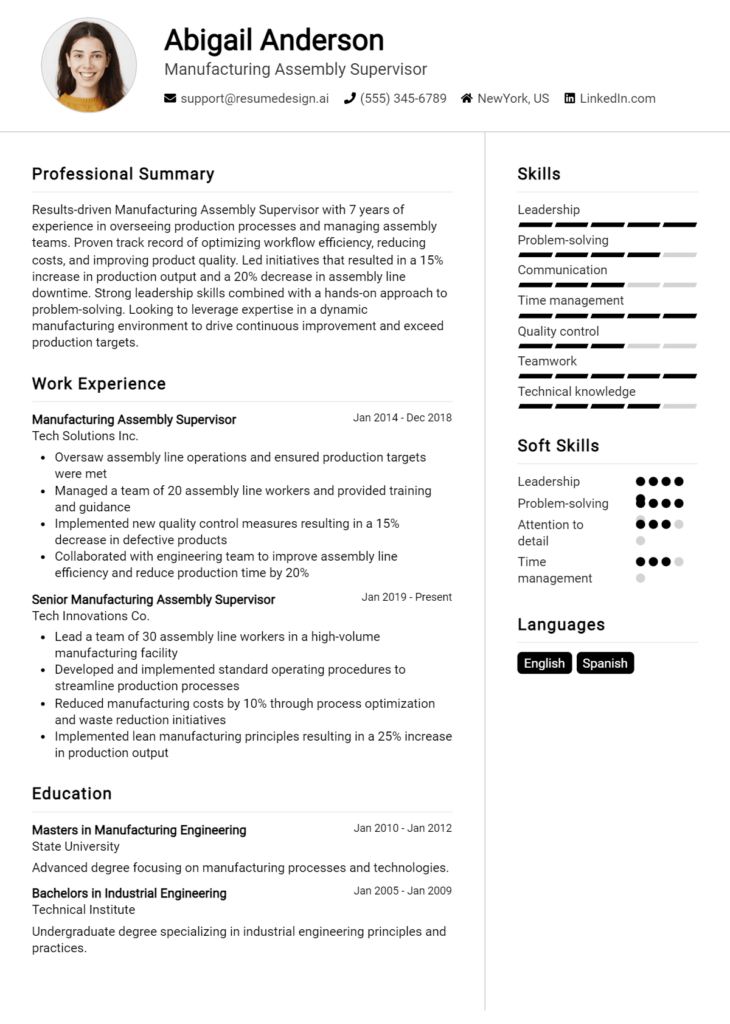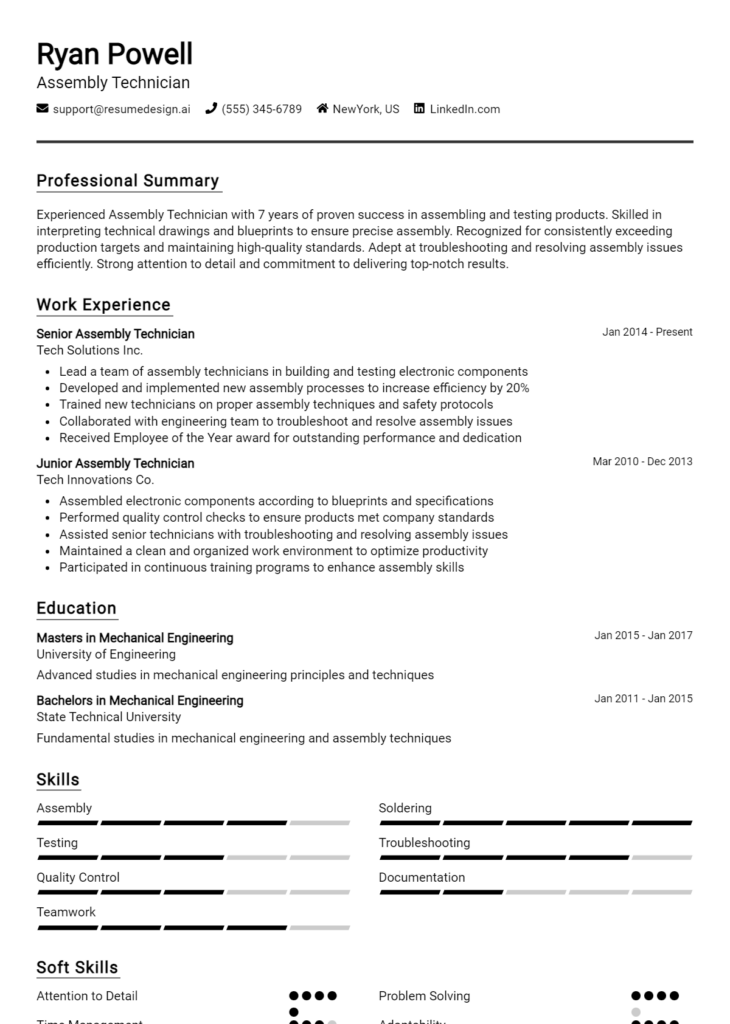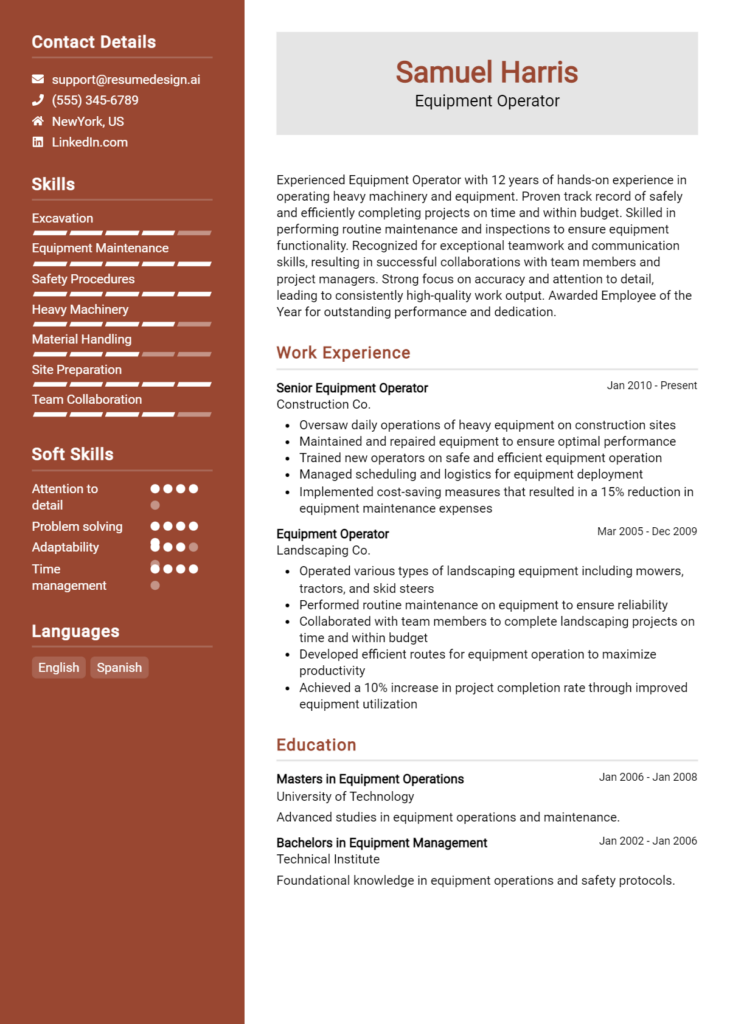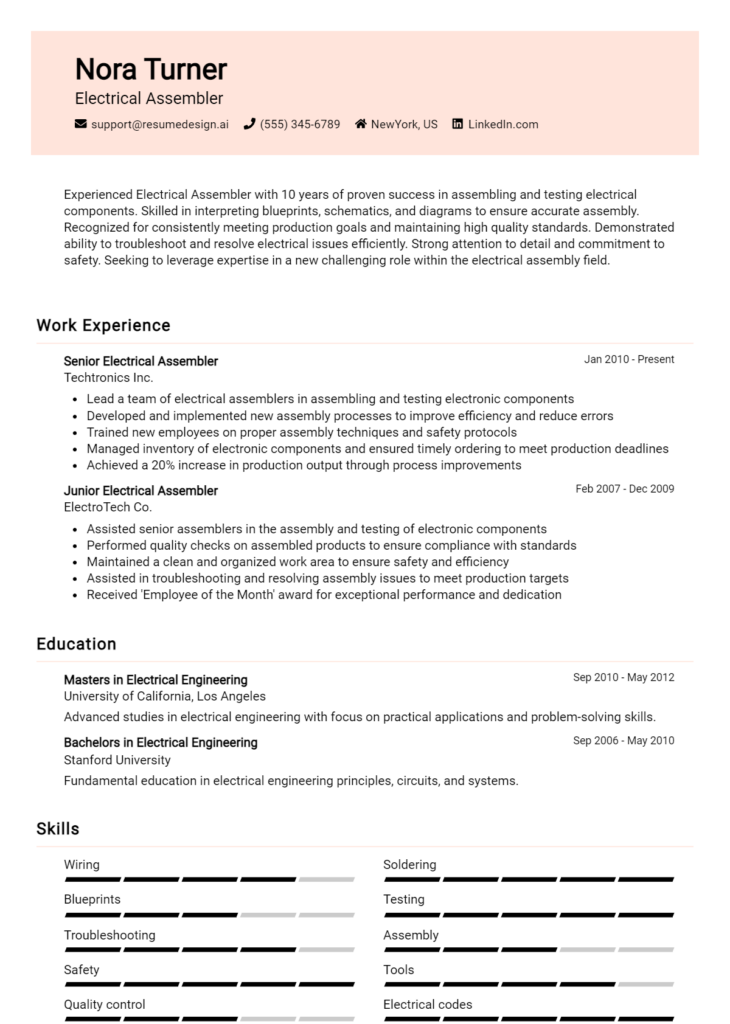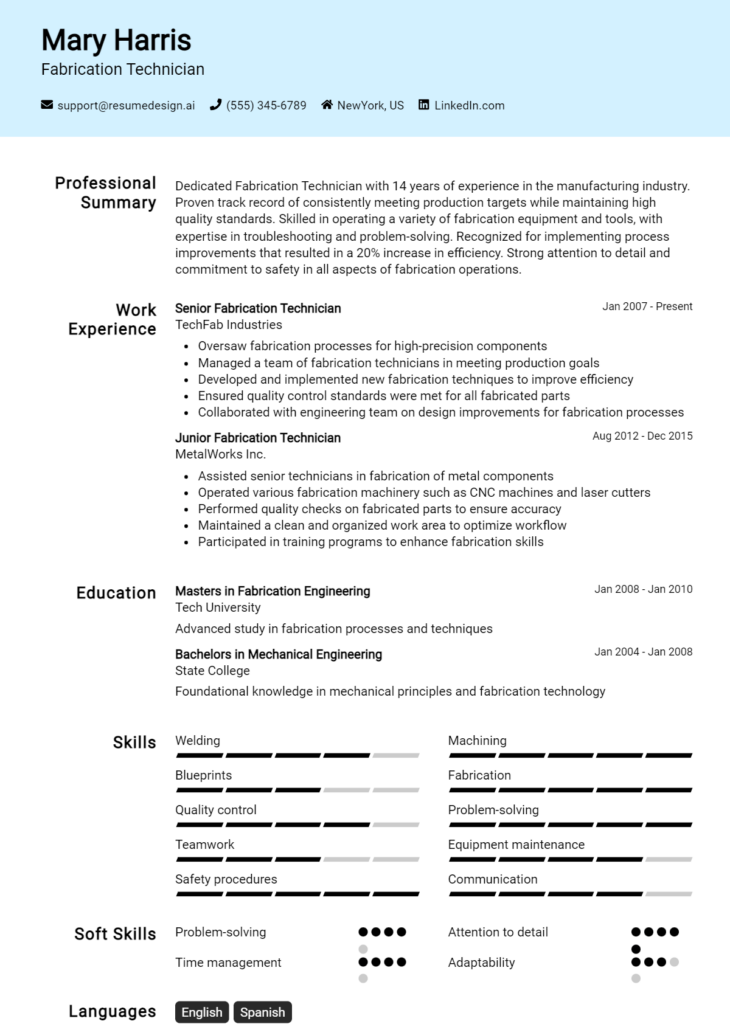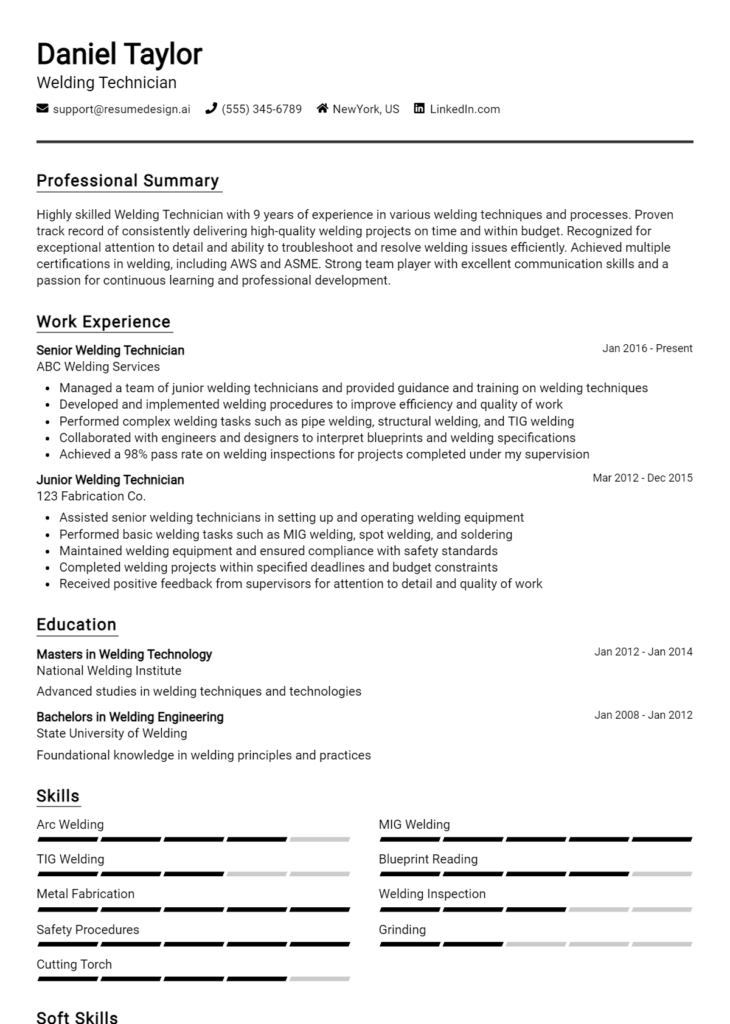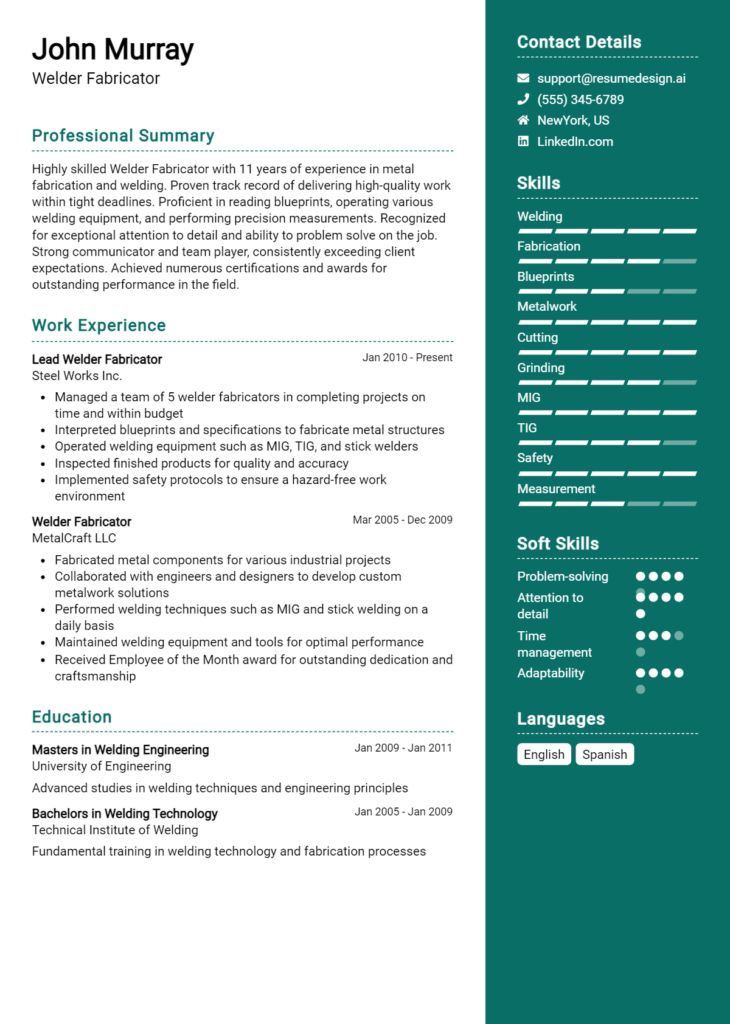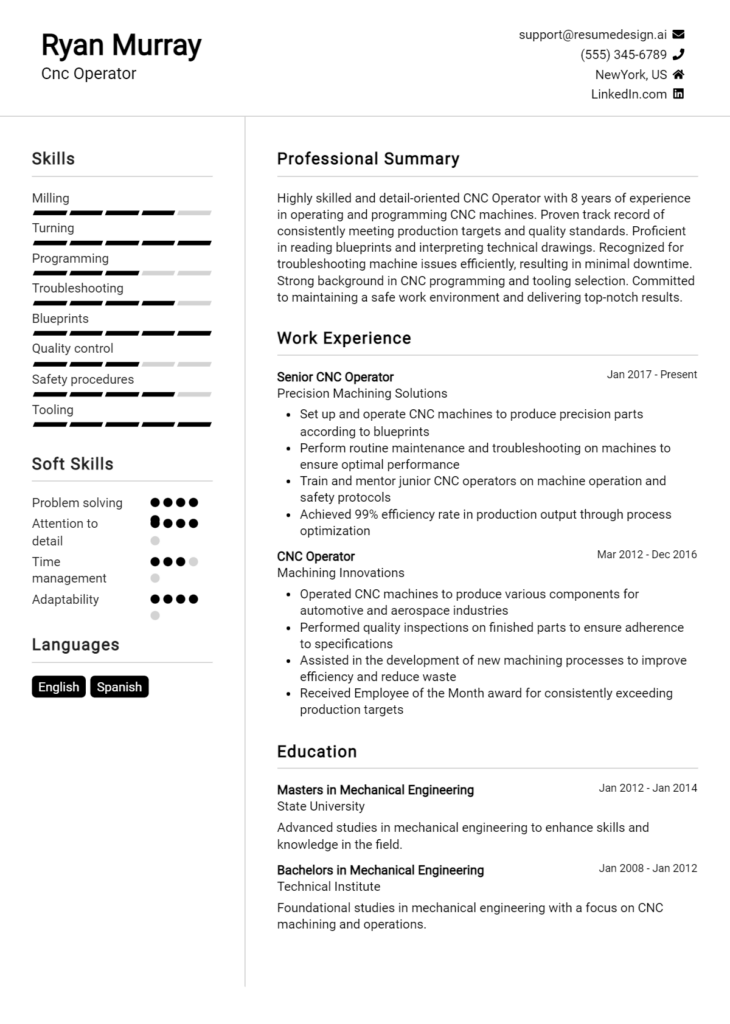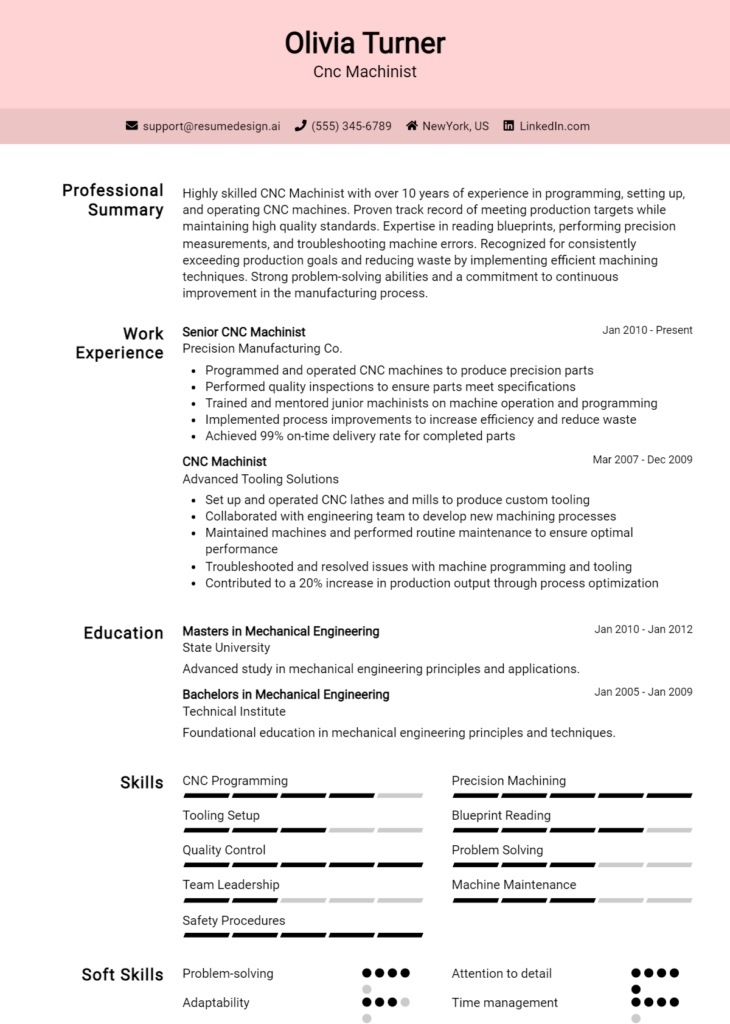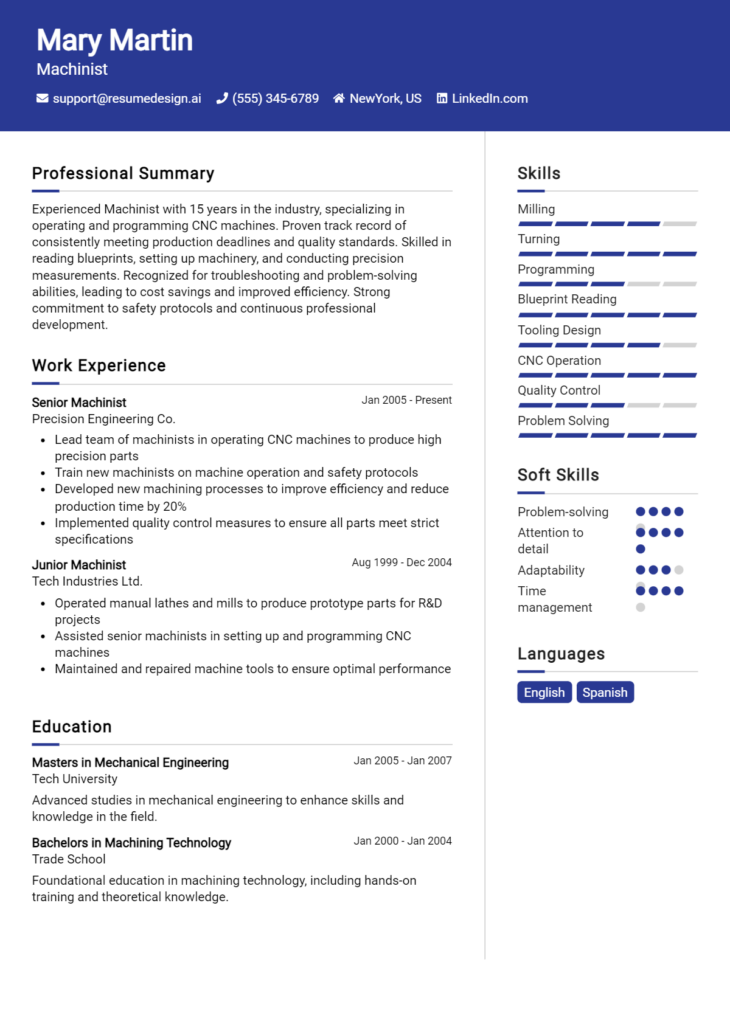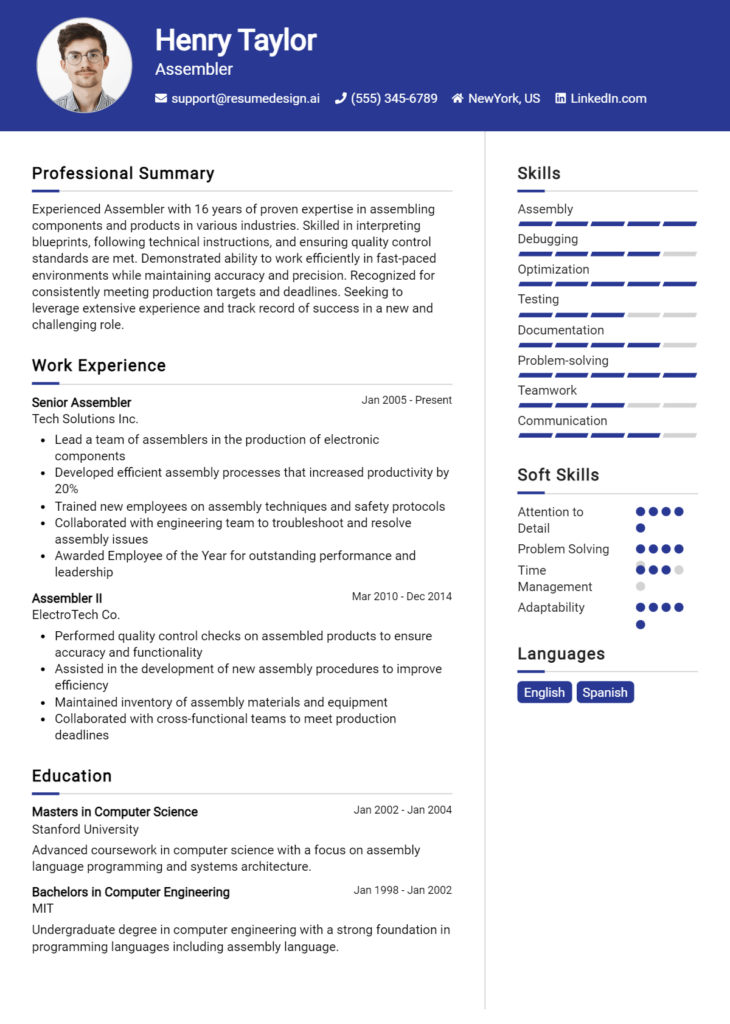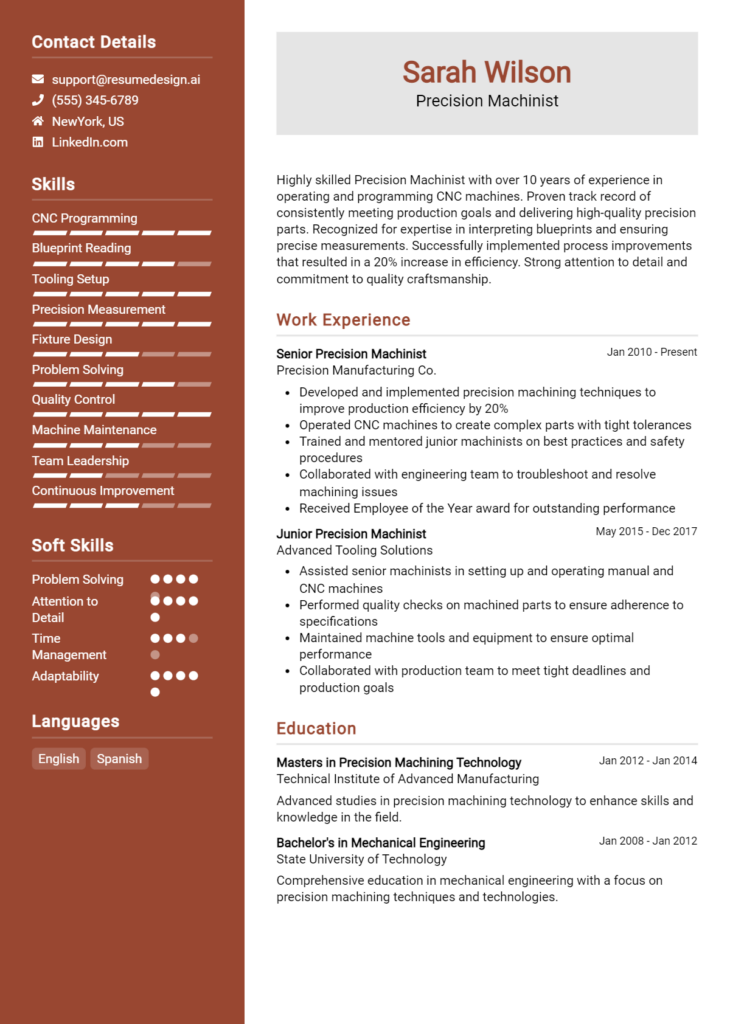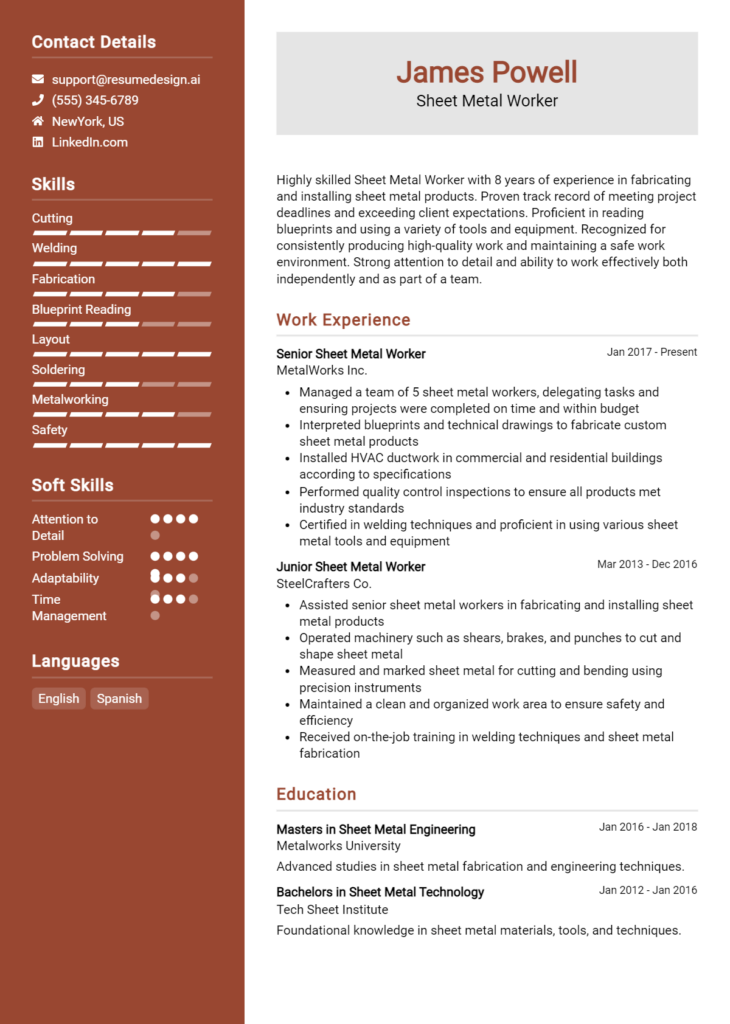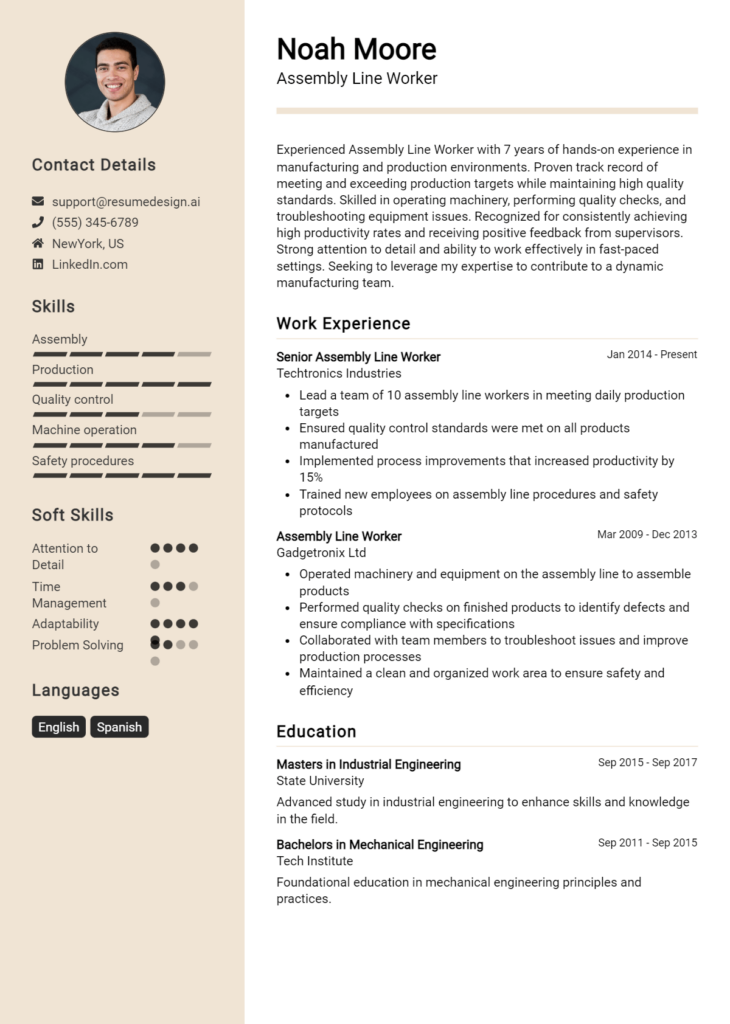Tool and Die Maker Core Responsibilities
A Tool and Die Maker is responsible for designing, fabricating, and repairing precision tools and dies used in manufacturing processes. This role requires strong technical skills in machining, welding, and blueprint reading, alongside excellent problem-solving abilities to troubleshoot issues that arise during production. By collaborating effectively with engineering, production, and quality assurance teams, Tool and Die Makers ensure that manufacturing goals are met efficiently. Highlighting these competencies in a well-structured resume is crucial for showcasing a candidate's qualifications and alignment with organizational objectives.
Common Responsibilities Listed on Tool and Die Maker Resume
- Design and create precision tools, dies, and fixtures.
- Read and interpret blueprints and technical drawings.
- Set up and operate various machining tools and equipment.
- Inspect and test tools to ensure they meet specifications.
- Repair and maintain existing tools and dies.
- Collaborate with engineers and production teams to resolve issues.
- Utilize CAD software for tool design and modification.
- Perform quality control checks throughout the manufacturing process.
- Adhere to safety regulations and best practices in the workplace.
- Document processes and maintain accurate records of work performed.
- Train and mentor junior staff on tool-making techniques.
High-Level Resume Tips for Tool and Die Maker Professionals
In the competitive field of Tool and Die Making, a well-crafted resume is crucial for standing out to potential employers. Your resume is often the first impression you make, and it serves as a reflection of your skills, achievements, and professionalism. A thoughtfully designed resume not only highlights your technical expertise but also showcases your accomplishments in a way that resonates with hiring managers. This guide will provide practical and actionable resume tips specifically tailored for Tool and Die Maker professionals, helping you to effectively communicate your unique value in the industry.
Top Resume Tips for Tool and Die Maker Professionals
- Tailor your resume to the specific job description by incorporating relevant keywords and phrases.
- Highlight your experience with various tools and machinery that are commonly used in the industry.
- Quantify your achievements, such as the number of projects completed, efficiency improvements, or cost savings realized.
- Showcase your technical skills, including CAD software proficiency, blueprint reading, and fabrication techniques.
- Include certifications and training relevant to Tool and Die Making, such as CNC programming or safety courses.
- Emphasize teamwork and collaboration experiences, as these are essential in a manufacturing environment.
- Use action verbs to describe your responsibilities and accomplishments, making your contributions clear and impactful.
- Keep your resume concise and organized, ensuring easy readability for hiring managers.
- Consider including a summary statement at the top of your resume that encapsulates your skills and career goals.
By implementing these tips, you can significantly enhance the effectiveness of your resume, increasing your chances of landing a job in the Tool and Die Maker field. A well-structured resume that effectively showcases your qualifications will not only attract the attention of hiring managers but also demonstrate your commitment to the craft, setting you apart from the competition.
Why Resume Headlines & Titles are Important for Tool and Die Maker
In the competitive field of tool and die making, a well-crafted resume headline or title holds significant importance. It serves as the first impression that potential employers will have of a candidate, making it essential to grab the attention of hiring managers immediately. A strong headline can effectively summarize a candidate's key qualifications, skills, and experience in one impactful phrase. This statement should be concise, relevant, and directly related to the job being applied for, ensuring that it resonates with the specific needs of the hiring organization.
Best Practices for Crafting Resume Headlines for Tool and Die Maker
- Keep it concise: Aim for a headline that is brief and to the point.
- Be role-specific: Tailor your headline to reflect the specific position you are applying for.
- Highlight key skills: Include essential skills or qualifications relevant to tool and die making.
- Use active language: Employ action verbs that convey your strengths and capabilities.
- Incorporate relevant keywords: Use industry-specific terminology that aligns with the job description.
- Avoid jargon: Ensure the language is clear and understandable to all potential readers.
- Showcase achievements: If applicable, include notable accomplishments that set you apart.
- Make it impactful: Aim for a headline that leaves a memorable impression on the reader.
Example Resume Headlines for Tool and Die Maker
Strong Resume Headlines
"Experienced Tool and Die Maker Specializing in Precision Manufacturing"
“Detail-Oriented Tool and Die Maker with 10+ Years of Industry Experience”
“Results-Driven Tool and Die Expert with Proven Track Record in Cost Reduction”
Weak Resume Headlines
“Tool and Die Maker Looking for Job”
“Skilled Worker in Manufacturing”
Strong headlines are effective because they convey specific skills and experiences that align with the job requirements, making the candidate stand out in a crowded applicant pool. They provide a clear overview of what the candidate brings to the table, enticing hiring managers to read further. On the other hand, weak headlines fail to impress because they are vague and lack relevant details, leaving hiring managers with little incentive to pursue the candidate’s resume. A powerful headline can be the difference between landing an interview and being overlooked in the selection process.
Writing an Exceptional Tool and Die Maker Resume Summary
A well-crafted resume summary is a critical component for a Tool and Die Maker seeking to make a strong impression on hiring managers. This brief introductory paragraph serves to quickly capture attention by highlighting key skills, relevant experience, and noteworthy accomplishments pertinent to the role. An effective summary should be concise yet impactful, tailored specifically to the job in question, ensuring that the candidate stands out in a competitive landscape. By presenting a snapshot of their professional capabilities, candidates can entice employers to delve deeper into their resumes, increasing the chances of securing an interview.
Best Practices for Writing a Tool and Die Maker Resume Summary
- Quantify Achievements: Use numbers to showcase your contributions, such as the percentage of efficiency improvements or cost savings.
- Focus on Relevant Skills: Highlight specific technical skills and tools that are pertinent to the role, such as CAD software or machining techniques.
- Tailor for the Job Description: Customize your summary to align with the specific requirements and keywords mentioned in the job posting.
- Showcase Certifications: Mention any relevant certifications or training that demonstrate your qualifications and commitment to the trade.
- Highlight Problem-Solving Abilities: Briefly describe instances where you have successfully resolved complex issues in tool and die making.
- Emphasize Team Collaboration: Note your experience working in teams, as collaboration is often crucial in manufacturing settings.
- Keep it Concise: Aim for 3-5 sentences that deliver maximum impact without overwhelming the reader.
- Use Strong Action Verbs: Start sentences with dynamic verbs to convey proactivity and accomplishment.
Example Tool and Die Maker Resume Summaries
Strong Resume Summaries
Detail-oriented Tool and Die Maker with over 8 years of experience in precision machining and fabrication. Successfully reduced production downtime by 25% through the implementation of process improvements and maintenance schedules.
Skilled Tool and Die Maker proficient in CAD software and CNC machining, with a proven track record of completing projects 15% under budget and ahead of schedule. Committed to maintaining high-quality standards and adhering to safety protocols.
Results-driven Tool and Die Maker with expertise in designing and fabricating complex dies and molds. Achieved a 30% increase in production efficiency by streamlining workflow processes and enhancing team training programs.
Weak Resume Summaries
Experienced Tool and Die Maker looking for a new job. I work well with others and have some technical skills.
Tool and Die Maker with a variety of skills in machining and manufacturing. Seeking to leverage my experience in a new role.
The examples provided illustrate the stark differences between strong and weak resume summaries. Strong summaries are characterized by specificity, quantifiable results, and relevance to the job, effectively demonstrating the candidate's value. In contrast, weak summaries lack detail and fail to convey significant accomplishments or skills, making them forgettable and ineffective in capturing the attention of hiring managers.
Work Experience Section for Tool and Die Maker Resume
The work experience section of a Tool and Die Maker resume is critical as it serves as a comprehensive representation of the candidate's technical skills, leadership capabilities, and ability to produce high-quality products. This section not only highlights the hands-on experience in the intricate processes of tool and die making but also demonstrates the candidate's proficiency in managing teams and collaborating with others to achieve superior results. Quantifying achievements—such as increased production efficiency or reduced error rates—and aligning past experiences with industry standards are essential for making a compelling case to potential employers.
Best Practices for Tool and Die Maker Work Experience
- Start each bullet point with strong action verbs to convey impact.
- Quantify achievements, such as production output or cost savings, to provide context.
- Highlight specific technical skills relevant to tool and die making, such as CNC machining or CAD software proficiency.
- Include details about leadership roles or team collaboration to showcase management abilities.
- Use industry-specific terminology to align with employer expectations.
- Focus on results and outcomes rather than just responsibilities to demonstrate effectiveness.
- Tailor experiences to match the job description of the position you are applying for.
- Keep descriptions concise but informative to maintain the reader’s attention.
Example Work Experiences for Tool and Die Maker
Strong Experiences
- Led a team of 5 in the design and production of precision dies, resulting in a 30% reduction in manufacturing time and a 15% decrease in material waste.
- Implemented a new CNC machining process that increased tool production efficiency by 40%, significantly enhancing output without compromising quality.
- Collaborated with design engineers to create custom tooling solutions that improved product fit and functionality, yielding a 25% increase in customer satisfaction ratings.
- Trained and mentored junior machinists on advanced manufacturing techniques, leading to a 50% reduction in training time and enhanced team productivity.
Weak Experiences
- Worked on various projects in tool making without specifying outcomes or responsibilities.
- Assisted in the production of parts, but did not detail specific contributions or results achieved.
- Performed routine maintenance on machines without mentioning the impact or improvements made.
- Participated in team meetings and discussions but did not clarify any leadership role or significant input.
The examples provided are considered strong because they clearly articulate specific achievements, quantify results, and demonstrate leadership and collaboration in a meaningful way. In contrast, the weak experiences lack detail, results, and any measurable impact, making them less compelling to potential employers. Strong examples not only highlight technical expertise but also convey the candidate's ability to contribute to the organization’s success effectively.
Education and Certifications Section for Tool and Die Maker Resume
The education and certifications section of a Tool and Die Maker resume is crucial as it showcases the candidate's academic background and professional qualifications. This section not only emphasizes the formal education received but also highlights any industry-relevant certifications and specialized training undertaken by the candidate. By detailing relevant coursework and continuous learning efforts, candidates can enhance their credibility and demonstrate their commitment to staying updated with industry standards, making them more aligned with the job role and attractive to potential employers.
Best Practices for Tool and Die Maker Education and Certifications
- Prioritize relevant educational qualifications directly related to tool making, machining, or mechanical engineering.
- Include industry-recognized certifications, such as those from the National Institute for Metalworking Skills (NIMS) or other relevant organizations.
- Detail any specialized training or apprenticeships that provide hands-on experience in tool and die making.
- List relevant coursework that demonstrates technical skills and knowledge applicable to the job role.
- Use clear and concise formatting to present information, making it easy for hiring managers to assess qualifications at a glance.
- Highlight any continuing education courses that reflect a dedication to professional growth and adaptation to new technologies.
- Include any honors or special recognitions received during educational pursuits that may set the candidate apart.
- Be mindful of the chronological order, placing the most recent qualifications at the top of the list.
Example Education and Certifications for Tool and Die Maker
Strong Examples
- Associate Degree in Tool and Die Technology, ABC Community College, 2021
- NIMS Certified Tool and Die Maker, 2022
- Completed coursework in Advanced CNC Machining, XYZ Technical Institute
- Diploma in Precision Machining, DEF Vocational School, 2020
Weak Examples
- Bachelor of Arts in History, GHI University, 2018
- Certification in Basic Computer Skills, 2019
- High School Diploma, JKL High School, 2016
- Outdated certification in General Manufacturing, 2017
The strong examples listed above are relevant and specific to the tool and die making profession, demonstrating the candidate's technical skills, hands-on experience, and commitment to professional development. In contrast, the weak examples do not align with the job requirements; they either pertain to unrelated fields or are outdated, which diminishes the candidate's credibility and relevance in the tool and die making industry.
Top Skills & Keywords for Tool and Die Maker Resume
In the competitive field of tool and die making, a comprehensive resume that emphasizes relevant skills is essential for standing out to potential employers. A well-crafted resume not only showcases a candidate's technical prowess but also highlights the soft skills that contribute to effective teamwork and problem-solving in a manufacturing environment. By focusing on both hard and soft skills, job seekers can present a well-rounded profile that aligns with the demands of the industry. For those looking to create an impactful resume, understanding the key skills required for a Tool and Die Maker role is crucial, as they directly correlate with job performance and career advancement.
Top Hard & Soft Skills for Tool and Die Maker
Soft Skills
- Attention to Detail
- Problem-Solving
- Communication Skills
- Teamwork and Collaboration
- Time Management
- Adaptability
- Critical Thinking
- Initiative
- Work Ethic
- Customer Service Orientation
- Conflict Resolution
- Active Listening
- Decision Making
- Creativity
- Interpersonal Skills
Hard Skills
- Blueprint Reading
- CNC Machining
- Precision Measurement
- Tool Design and Fabrication
- Welding Techniques
- Wire EDM (Electrical Discharge Machining)
- Injection Molding Knowledge
- CAD Software Proficiency (e.g., AutoCAD, SolidWorks)
- Machining Processes (Milling, Turning, Grinding)
- Quality Control Practices
- Material Selection and Properties
- Fixture Design
- Die Maintenance and Repair
- Safety Protocols and Procedures
- Computer Programming for CNC Machines
For more information on enhancing your resume with appropriate skills and highlighting your work experience, consider researching industry-specific examples and templates.
Stand Out with a Winning Tool and Die Maker Cover Letter
Dear [Hiring Manager's Name],
I am writing to express my interest in the Tool and Die Maker position at [Company Name] as advertised on [Job Board/Company Website]. With over [X years] of hands-on experience in precision machining and a strong background in designing and fabricating complex tools and dies, I am confident in my ability to contribute significantly to your team. My proficiency in operating CNC machines, coupled with my keen attention to detail and problem-solving skills, allows me to produce high-quality components that meet stringent specifications and enhance manufacturing efficiency.
Throughout my career, I have successfully collaborated with engineers and production teams to develop innovative tooling solutions. At [Previous Company Name], I played a vital role in optimizing the production process by designing a new die that reduced scrap rates by 20% and improved cycle times. I am well-versed in interpreting blueprints and technical drawings, enabling me to accurately assess the feasibility of designs and provide valuable input during the early stages of product development. My commitment to continuous improvement and quality assurance has always driven me to seek out new techniques and technologies that can enhance our capabilities.
I am excited about the opportunity to bring my expertise to [Company Name] and contribute to your reputation for excellence in manufacturing. I am particularly impressed by [specific aspect or project of the company], and I believe my skills in tool design and machining align well with your goals. I am eager to leverage my experience and passion for precision engineering to help [Company Name] continue to deliver outstanding products to your clients.
Thank you for considering my application. I look forward to the possibility of discussing how my background, skills, and enthusiasms can contribute to the success of your team. I am available at your earliest convenience for an interview and can be reached at [Your Phone Number] or [Your Email Address].
Warm regards,
[Your Name]
Common Mistakes to Avoid in a Tool and Die Maker Resume
When crafting a resume for a Tool and Die Maker position, it's essential to present your skills and experiences effectively. However, many candidates make common mistakes that can hinder their chances of securing an interview. Avoiding these pitfalls will help ensure that your resume stands out in a competitive job market.
Neglecting Technical Skills: Failing to highlight specific technical skills relevant to tool and die making, such as CAD software proficiency or knowledge of machining processes, can make your resume less appealing to employers.
Using Generic Job Descriptions: Listing job duties in a generic manner rather than tailoring them to the specific role can make your experience seem less relevant. Focus on your unique contributions and achievements in previous roles.
Ignoring Certifications: Not mentioning relevant certifications, such as those from the National Institute for Metalworking Skills (NIMS), can lead to missed opportunities. Certifications demonstrate your commitment to the trade and validate your skills.
Overloading with Jargon: While industry-specific language can showcase your expertise, overloading your resume with jargon can alienate hiring managers who may not be as familiar with certain terms. Strive for a balance between technical terms and clear communication.
Omitting Soft Skills: Tool and Die Makers not only need technical skills but also soft skills like problem-solving and teamwork. Failing to include these can give an incomplete picture of your capabilities.
Lack of Quantifiable Achievements: Simply stating job responsibilities without quantifiable achievements makes it harder for employers to gauge your impact. Use metrics or specific examples to illustrate how you improved processes or contributed to projects.
Ignoring Formatting Consistency: Inconsistent formatting, such as varying font sizes or styles, can create a chaotic and unprofessional appearance. Ensure that your resume has a clean, uniform layout to enhance readability.
Not Customizing for Each Application: Sending out the same resume for multiple applications can be detrimental. Tailoring your resume to each specific job description shows that you've taken the time to understand the role and how your skills align with the company's needs.
Conclusion
As a Tool and Die Maker, your expertise in designing, constructing, and maintaining tools and dies is vital in the manufacturing process. This role requires a keen understanding of engineering principles, precision measurement, and the ability to work with various materials. Throughout the article, we've explored the essential skills, responsibilities, and career opportunities available in this field, emphasizing the importance of technical proficiency and attention to detail.
In conclusion, it's crucial to ensure that your resume effectively showcases your skills and experiences as a Tool and Die Maker. A well-crafted resume can significantly enhance your chances of landing your desired job in this competitive industry. To assist you in this process, we encourage you to take advantage of the various resources available:
- Explore resume templates that can help you create a professional and eye-catching resume format.
- Utilize our resume builder to streamline the resume creation process, making it easier to highlight your qualifications.
- Check out resume examples for inspiration and guidance on how to structure your content effectively.
- Don't forget to craft a compelling cover letter using our cover letter templates to accompany your resume.
Take action today by reviewing and updating your Tool and Die Maker resume, ensuring it reflects your expertise and stands out to potential employers. Your next opportunity awaits!

